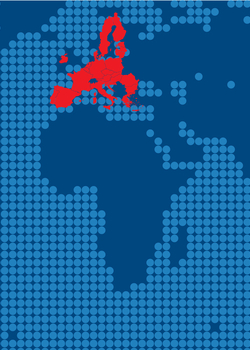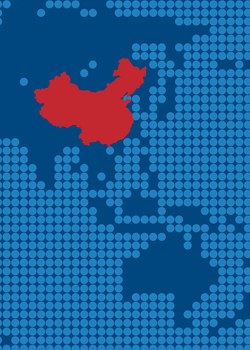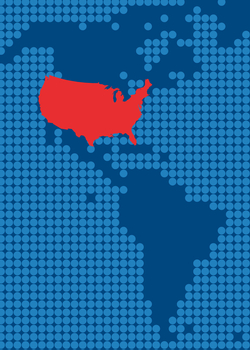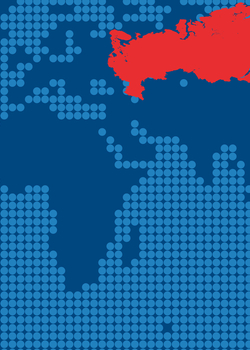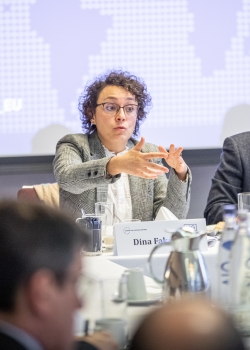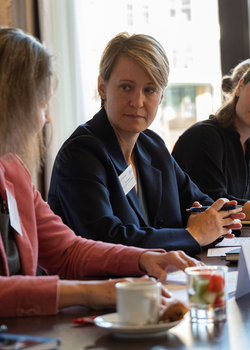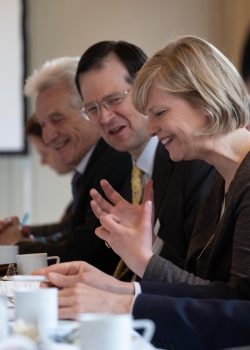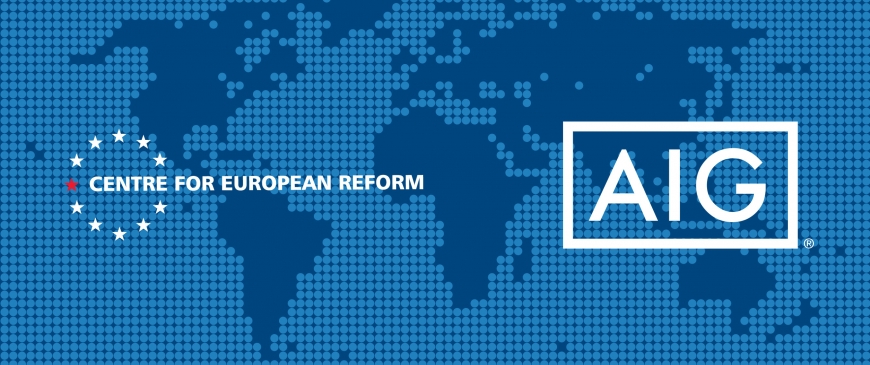
CER/AIG Geopolitical Risk Series
The Centre for European Reform and AIG's seminar series on geopolitical risk invites key politicians, policy-makers and representatives of business to converse in an informal atmosphere. Discussions focus on Europe's global role and its ability to act strategically in its external relations, political and economic. Please see all events in the series listed below, including our forthcoming dates.
CER/AIG Geopolitical Risk Series: Webinar on 'EU enlargement after Russia's invasion of Ukraine'
With Laura Ahrens, Head, EU External Policies Division, Federal Foreign Office, Germany, Heather Grabbe, Senior Advisor, Open Society European Policy Institute, and Andreas Metz, Head of Public Affairs, German Eastern Business Association.
The war in Ukraine and the country’s application to join the EU have provided fresh impetus to the debate over EU enlargement. Member-states are considering allowing the Western Balkans to join the Union, and Georgia and Moldova, fearing Putin’s territorial ambitions, have also formally applied for membership. The EU is divided over the issue. Opponents of enlargement think it necessary to deepen integration before widening the circle of EU member-states, or worry that any accession promise would be empty in light of the many hurdles on the way to membership. Proponents, meanwhile, make the case that opening up EU membership is not only a geopolitical interest but also a moral obligation for the Union. How should the EU approach political and economic relations with its Eastern neighbourhood? Is a coherent approach possible? How realistic are accession prospects for the countries in question? What should we make of President Macron’s proposal of a “political community”?
CER/AIG webinar on 'EU-China co-operation on climate action after COP26'
With Paolo Caridi, Responsible for China Relations, Directorate-General for Climate Action, European Commission, Norbert Gorißen, Deputy Director-General & Head of the International Policy Directorate, German Federal Ministry for the Environment, Nature Conservation & Nuclear Safety and Janka Oertel, Director of the Asia Programme, European Council on Foreign Relations.
Which steps forward have the EU and China taken in climate policy in the past year and at COP26? How can Europeans strike a balance between a need to co-operate on climate policy, and the political and trade tensions between the EU and China? Is a coal phase-out closer after COP26 and China's announcement to stop coal financing overseas? What are the implications of the EU's proposed carbon border adjustment mechanism on China? And can the EU and China be the joint promoters of a global price on carbon?
CER/AIG webinar on 'Forging a middle way: How can the EU navigate the US-China digital divide?'
With Aynne Kokas, Wilson China Fellow, Wilson Center, Caroline Meinhardt, Analyst, Mercator Institute for China Studies (MERICS) and Alexander Roth, Deputy Head of Division for China, Federal Foreign Office, Germany.
China and the US are sharp rivals on digital matters, seeking to exclude each other's influence in their home territories while projecting their own influence globally. Europe positions itself as an autonomous actor. It aims to follow a 'middle path', illustrated by some EU countries' continued use of Chinese communications hardware despite US pressure to stop. The EU wants to compartmentalise disputes with China: maintaining the EU's core values while also ensuring trade and investment survives despite China's search for digital autonomy. But the EU needs to address questions about whether its desire for an autonomous relationship with China is sustainable if the US and Chinese digital economies become more segregated. How will this trend impact the EU's relations with other countries? And how will the EU's digital sector remain relevant in the scale of the US and China's investments in emerging technology?
CER/AIG webinar on 'Climate and energy in the transatlantic relationship'
With Heather Grabbe, Director, Open Society European Policy Institute, Cassie Powers, Managing Director, Programs, National Association of State Energy Officials, Carsten Rolle, Head of the Energy and Climate Politics Department, Federation of German Industries (BDI) and Achim Schkade, Head of the Division for Climate and Environmental Foreign Policy, Federal Foreign Office, Germany.
President Joe Biden will revive transatlantic co-operation on climate and energy. But can the "transatlantic green deal" be more than a slogan? How might the US and Europe work together on complementary carbon pricing, supply chain co-operation, joint investments and green standard setting?
CER/AIG webinar on 'Russia and the EU: Winter is coming (again)'
With Michael Harms, Executive Director, German Eastern Business Association (OAOEV), Agnieszka Legucka, Analyst, Polish Institute of International Affairs (PISM), Kadri Liik, Senior Policy Fellow, European Council on Foreign Relations, and Christian Pernhorst, Deputy Head of Division for Russia, Belarus, Moldova and Eastern Partnership, Federal Foreign Office, Germany.
EU-Russia political relations have been in the deep freeze since the annexation of Crimea. Is Emmanuel Macron right to think that Europe can never be stable unless it has better relations with Russia? Or is Russia just a disruptive power that the EU has to manage, while dealing with more serious challenges in other parts of the world? What's the significance of Russia's increasing economic and political co-operation with China? Are they allies of circumstance or conviction? Will China replace the EU as a supplier to the Russian market for manufactured goods? Should (and can) Europe try to pull Russia away from China's economic and political orbit? Ever since the Soviet era, gas and oil have flowed westwards to Europe, regardless of the state of Europe's political relations with the Kremlin. Will Russia remain a reliable supplier, despite political tension with the EU? As the European Green Deal changes Europe's energy needs, will the EU remain a reliable consumer? What impact will changing patterns of energy demand have on the political relationship? How important are events in the US to EU-Russia relations? And what difference would a Biden presidency or a second term for Trump make to the prospects for EU-Russia relations, or to the defence and security situation in Europe?
CER/AIG breakfast on 'What role for Europe in the Middle East?'
With Dina Fakoussa, Head of the Middle East and North Africa Program, German Council on Foreign Relations (DGAP) and Michael Ohnmacht, Head of the Middle East Department, Federal Foreign Office.
The Middle East is pivotal to European security. Slow economic growth, poor governance, political instability, violent conflict, extremism and migration will continue to directly or indirectly affect Europe for years to come. But the EU has appeared unable to exert influence in the region and promote stability. The Iran deal it brokered is in tatters, and Europeans have been unable to mitigate the conflict in Syria and to promote stability in Iraq. The US has become a more erratic and unreliable actor, while Russia has become an important regional power and China’s influence in the region in increasing. How should business deal with the great power competition in the region? How can the EU promote stability, prosperity and human rights? How should it engage with China and Russia? Can Europe promote democracy and stability at the same time?
CER/AIG breakfast on 'The US and the EU: Entering a new phase'
With Susanne Riegraf, Head of Division North America, G7, Federal Foreign Office, Jana Puglierin, Head of the Alfred Von Oppenheim Center for European Policy Studies, German Council on Foreign Relations (DGAP) and Stormy-Annika Mildner, Head of the Foreign Economic Policy Department, Federation of German Industries (BDI).
Almost two years into the presidency of Donald Trump, transatlantic relations continue to adapt to the new realities of his 'America First' foreign policy. The US leadership is hostile to multilateral alliances, free trade and the institutions that underpin it. President Trump has been particularly critical of the EU and his NATO allies, but he is not to blame for all the threats to the transatlantic partnership; longer term changes in the relationship are also at work. At the same time, no economic relationship is bigger than the US’s with Europe, and no defence alliance more closely knit than NATO. How can Europeans prepare for and shape this changing relationship with the US? Can the EU make common cause with other US trading partners to resist protectionist measures? Is European strategic independence from the US imaginable?
CER/AIG breakfast on 'China and the EU: New opportunities, new risks'
With Janka Oertel, Transatlantic Fellow, Berlin Office, The German Marshall Fund of the United States, Volker Stanzel, Vice President, German Council on Foreign Relations (DGAP) and Friedolin Strack, Head, International Markets Department, Federation of German Industries (BDI).
China’s Belt and Road Initiative (BRI) is the next stage in China’s efforts to expand its commercial and political influence. It has also been at the centre of an increasing number of political controversies, both foreign and domestic. While the BRI could provide opportunities for European companies, there are also voices criticising the Chinese initiatives as economically, environmentally and socially unsustainable, and doubts about China’s willingness to open up procurement to foreign firms. The political and financial dependencies created through Chinese investments also risk undermining political cohesion in Europe. Can the EU develop a common approach towards China, to develop the relationship on Europe’s terms? Could the EU’s new “Connectivity Strategy”, linking Europe and Asia, become a counterweight to the BRI?

